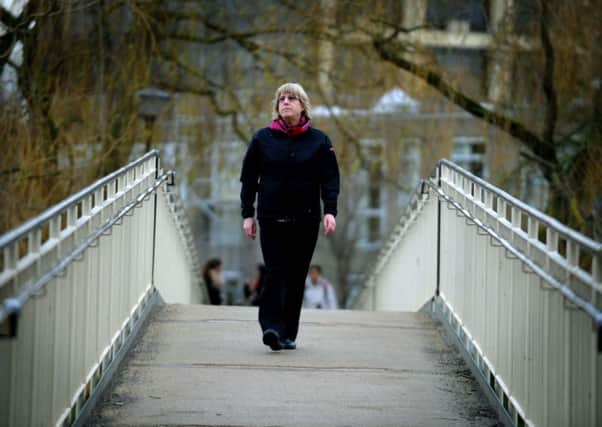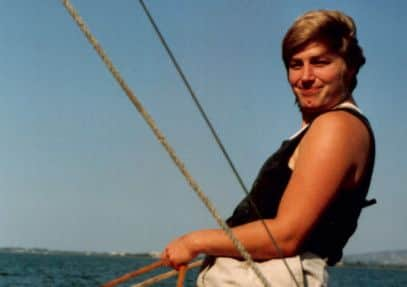A life and death battle that exposes the choices we all may have to make


Celia Kitzinger recently wrote a letter. Devoid of any emotion, it simply said that should she ever suffer from severe brain injuries or in later years develop dementia and become unable to make her own decisions, she wants it to be known that she refuses all treatment which would prolong her life. No ifs, no buts. Her mind is made up.
It’s not a particularly long letter, but after what happened to her younger sister, for Celia, a professor at the University of York, every word is vital.
Advertisement
Hide AdAdvertisement
Hide AdPolly was a keen gardener, an experienced sailor and on a weekend loved nothing more than pulling on her walking boots. However, in 2009 she was involved in a car crash, near to her home in Wales, and as a result suffered massive brain injuries.


“We suspect she might well have died at the scene had an ambulance not been passing,” says Celia. “Polly received very quick treatment, but it was clear that her injuries were so severe there was not an awful lot which could be done.
“We’ve always been the kind of family for whom subjects like death, politics and sex were discussed around the dinner table. We’ve always been very honest with each other and quite quickly we came to the realisation that whichever way you looked at it, the outcome for Polly was likely to be very grim.”
They were also certain they knew what Polly’s wishes would have been and in the early days and weeks after the crash they made various attempts to talk to doctors about the possible options.
Advertisement
Hide AdAdvertisement
Hide Ad“Polly would not have wanted to live without quality of life, as she saw it. We all knew that. However, when we initially approached the medical team we were told it was too early to decide what to do. I’m still not sure what they meant. Current guidelines state that following emergency treatment to stabilise a patient an assessment should be carried out to decide what, if any, future treatment is in their best interests.
“We found it incredibly frustrating that we struggled to even find a doctor to talk to. Polly had worked in the mental health sector, she was passionate about standing up for people whose voices weren’t being heard and whose rights were routinely overlooked. It was something of an irony that we found ourselves sat around her bedside looking at Polly who had been left in exactly that position.”
Polly is now in a care home and will remain there to the end of her life. While she is conscious, she has multiple profound mental and physical disabilities and is unable to make any serious decisions about her own medical treatment.
“It’s heart-breaking to see her like that when we know so absolutely that she wouldn’t have wanted to live a life like that,” says Celia. “Polly was always fiercely independent, but now she is wholly reliant on others.
Advertisement
Hide AdAdvertisement
Hide Ad“There is a tendency when people talk of someone in either a vegetative or semi-conscious state to picture someone in a Sleeping Beauty pose. That’s just so far from the truth. Some moan, they thrash around, they gnash their teeth. Doctors will tell you that, if they are vegetative, they aren’t suffering, but it doesn’t look like that.”
With Polly little more than a shell of the sister she had grown up with, Celia was prompted to write what’s known as an Advance Decision letter. In the event of a worse case scenario, the document (which must have a signature and a witness) is a legally binding refusal of treatment. If Polly had written one, the outcome for her could have been very different.
Without an Advance Decision, families can find it hard to know, or to communicate, what the person would have wanted. “We presented a 50-page document to the team looking after Polly. It included testimony from her friends and relatives as well as notes written by Polly herself, but it didn’t make any difference. By contrast, doctors can’t ignore an Advance Decision.”
Along with her sister Jenny Kitzinger, a professor at Cardiff University’s school of journalism, Celia wants to push the debate about how we treat those with severe brain injuries into the foreground. Currently, the withdrawal of artificial nutrition and hydration is the only legal method guaranteed to lead to death. However, it can take days, sometimes weeks, and many families are uncomfortable with the idea of their loved one starving to death.
Advertisement
Hide AdAdvertisement
Hide AdIn their latest research, the sisters carried out a series of interviews with the families of patients in a vegetative or minimally conscious state. The paper, published in the Journal of Medical Ethics, found that two-thirds of the 51 individuals questioned believed their relative would rather be dead than stay alive in a long-term vegetative or minimally-conscious state.
“However, far fewer were willing to consider a court application for the withdrawal of nutrition and hydration. Instead, some families proposed an alternative – of euthanasia by lethal injection – as a more humane option.”
While the sisters know they are entering an ethical minefield, they would like to see the issue at least being discussed.
“It has to be about choice,” says Celia, daughter of the birth rights campaigner Sheila Kitzinger. “There are some families who want all treatment options explored until every shred of hope has been eliminated, there are some for whom the idea of being ‘better off dead’ is too much of a taboo and then there are others, like us, who know early on that their loved one would want to be allowed to die.
Advertisement
Hide AdAdvertisement
Hide Ad“It is a highly emotive issue. Many of the people we interviewed were concerned that if they withdrew treatment their relative would experience pain or that it would be distressing for other family members to watch. There was a widespread perception that lethal injections would be more humane, compassionate and dignified. As one interviewee said ‘To starve somebody to death seems a particularly cruel thing to do’.”
One other key point to have emerged from the sisters’ work is a mistaken belief that it is the family who ultimately takes the decision.
“It’s not true. It is a legal process. In the UK the next of kin have no right to accept or refuse treatment on behalf of another adult. It is usually up to the clinicians treating an individual to make a decision about what’s in their best interests, but they should take into account what the patient would have wanted.
“All we would say is that if a court is going to take a decision to allow someone to die, why not do it in a way that is less prolonged for the patient or, if the patient is entirely unaware, then at least less distressing for their family?”
Advertisement
Hide AdAdvertisement
Hide AdWhenever the subject of euthanasia is raised, so too is the concern that it could leave already vulnerable people open to further abuse.
“There is a valid argument around consent,” says Celia. “But if you are going to say patients like Polly aren’t able to give their consent to a lethal injection you also have to accept that they can’t give their consent to the resuscitation, ventilation or antibiotics which so many of these patients are given to keep them alive in the first place.”
Together, Celia and Jenny run the York-Cardiff Chronic Disorders of Consciousness Research Centre and they are keen to raise awareness about end of life issues.
This year Celia will be organising, on behalf of the University of York, a festival about death and dying in York. The event will feature a number of keynote speakers and community events along with workshops to help people with end-of-life planning.
Advertisement
Hide AdAdvertisement
Hide Ad“We are not under any illusion about the brick wall we face. The courts have rejected the eloquent testimonies of various people desperate to be given the right to end their lives, so we are a long, long way off convincing them that those unable to communicate should be offered that same right.
“However, we do need to start talking much more openly about death. To pretend these complex issues don’t happen helps nobody.”